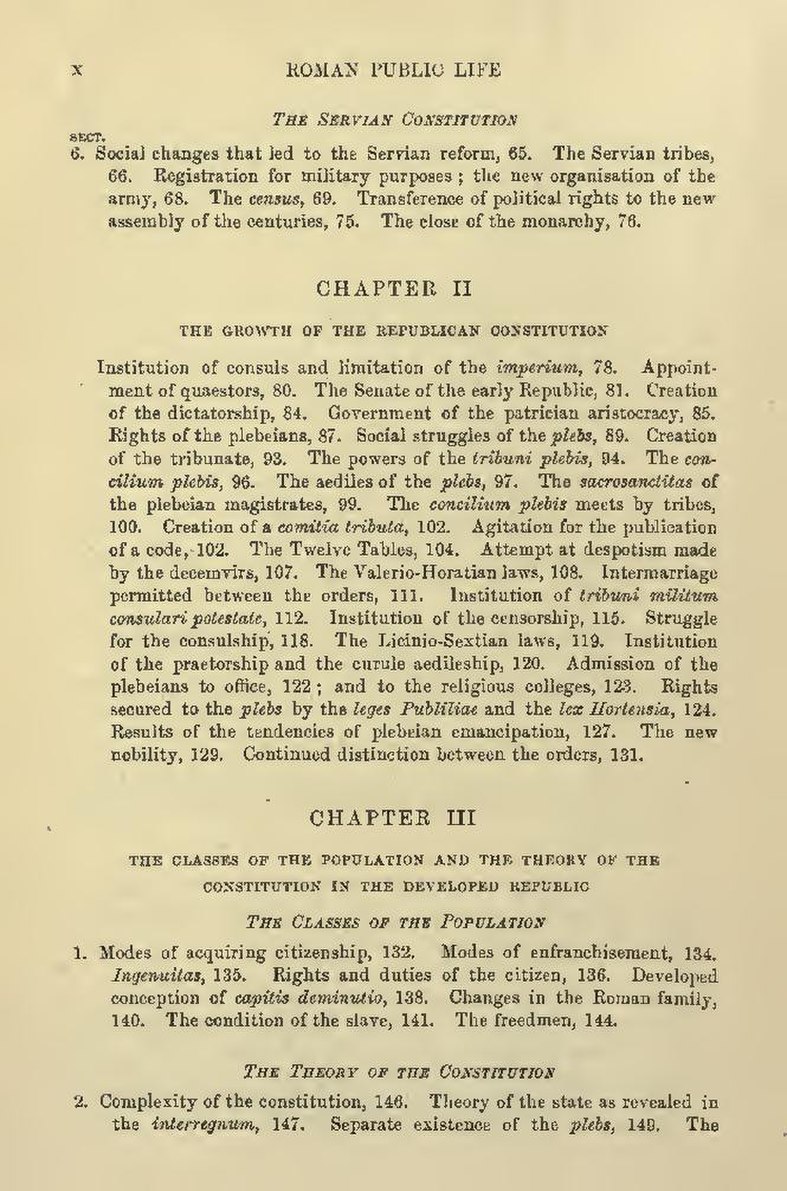The Servian Constitution
6. Social changes that led to the Servian reform, 65. The Servian tribes,
66. Registration for military purposes; the new organisation of the
army, 68. The census, 69. Transference of political rights to the new
assembly of the centuries, 75. The close of the monarchy, 76.
CHAPTER II
THE GROWTH OF THE REPUBLICAN CONSTITUTION
Institution of consuls and limitation of the imperium, 78. Appointment
of quaestors, 80. The Senate of the early Republic, 81. Creation
of the dictatorship, 84. Government of the patrician aristocracy, 85.
Rights of the plebeians, 87. Social struggles of the plebs, 89. Creation
of the tribunate, 93. The powers of the tribuni plebs, 94. The concilium
plebis, 96. The aediles of the plebs, 97. The sacrosanctitas of
the plebeian magistrates, 99. The concilium plebis meets by tribes,
100. Creation of a comitia tributa, 102. Agitation for the publication
of a code, 102. The Twelve Tables, 104. Attempt at despotism made
by the decemvirs, 107. The Valerio-Horatian laws, 108. Intermarriage
permitted between the orders, 111. Institution of tribuni militum
consulari potestate, 112. Institution of the censorship, 115. Struggle
for the consulship, 118. The Licinio-Sextian laws, 119. Institution
of the praetorship and the curule aedileship, 120. Admission of the
plebeians to office, 122; and to the religious colleges, 123. Rights
secured to the plebs by the leges Publiliae and the lex Hortensia, 124.
Results of the tendencies of plebeian emancipation, 127. The new
nobility, 129. Continued distinction between the orders, 131.
CHAPTER III
THE CLASSES OF THE POPULATION AND THE THEORY OF THE
CONSTITUTION IN THE DEVELOPED REPUBLIC
The Classes of the Population
1. Modes of acquiring citizenship, 132. Modes of enfranchisement, 134.
Ingenuitas, 135. Rights and duties of the citizen, 136. Developed
conception of capitis deminutio, 138. Changes in the Roman family,
140. The condition of the slave, 141. The freedmen, 144.
The Theory of the Constitution
2. Complexity of the constitution, 146. Theory of the state as revealed in
the interregnum, 147. Separate existence of the plebs, 149. The
Page:Roman public life (IA romanpubliclife00greeiala).pdf/14
Jump to navigation
Jump to search
This page needs to be proofread.
